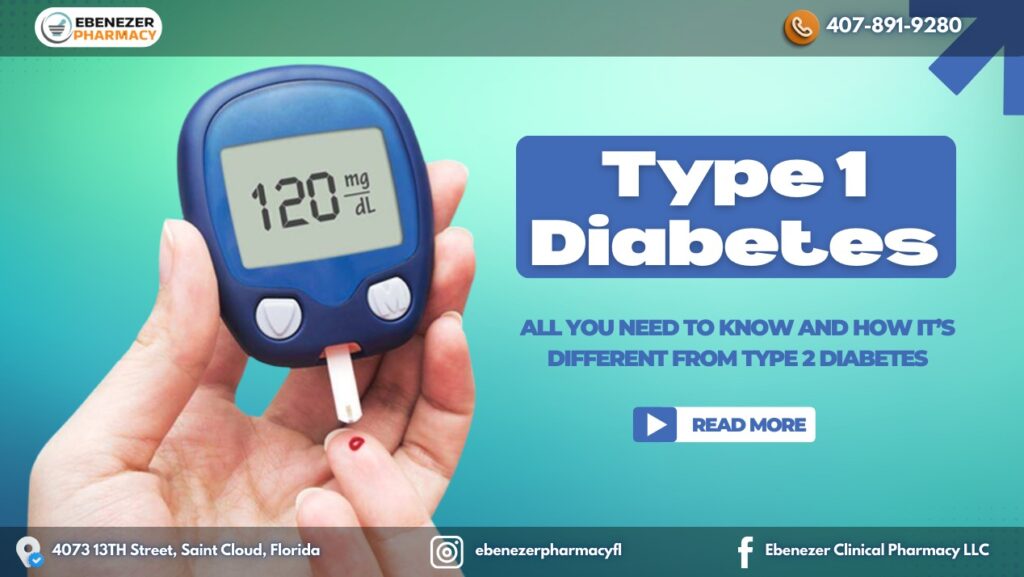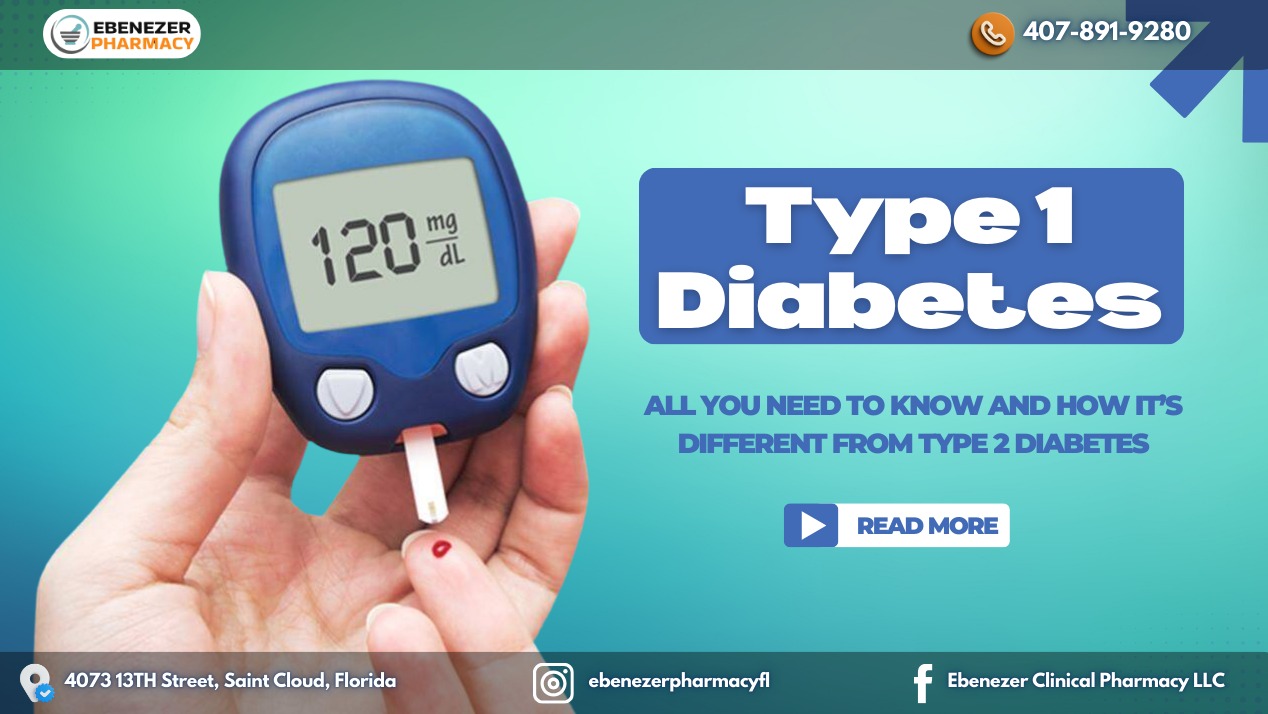Living with Type 1 Diabetes can feel overwhelming at first, but understanding the condition makes all the difference. Whether you’re newly diagnosed, supporting a loved one, or simply curious, this guide will help you break down what Type 1 Diabetes really is, how it differs from Type 2, and what symptoms to watch out for.
Let’s dive in!
What is Type 1 Diabetes?

Think of your pancreas as a little machine that produces insulin — a hormone that helps your body turn sugar from food into energy. In people with Type 1 Diabetes, the immune system mistakenly attacks this machine, leaving the body without insulin. This leads to high blood sugar levels, which can cause serious health issues if left untreated.
Unlike Type 2 Diabetes, which often develops due to lifestyle factors, Type 1 is an autoimmune condition. It’s something you’re born with a predisposition for, and it usually shows up during childhood or early adulthood.
Difference between type 1 and type 2 diabetes:
| Feature | Type 1 Diabetes | Type 2 Diabetes |
|---|---|---|
| Cause | Autoimmune reaction | Insulin resistance or insufficient insulin |
| Age of Onset | Mostly in children and young adults | Usually in adults, but increasingly in kids |
| Insulin Production | None (requires insulin therapy) | Reduced (may not require insulin therapy) |
| Common Risk Factors | Genetic predisposition | Lifestyle (obesity, inactivity), genetics |
While both types cause high blood sugar, Type 1 is insulin-dependent, meaning people need daily insulin to survive. Type 2, on the other hand, can often be managed with lifestyle changes and medication.
Diabetes Symptoms to Watch Out For
Type 1 Diabetes symptoms can appear suddenly or develop over time. Here’s what to look out for:
- Excessive thirst
- Frequent urination (including bedwetting in children)
- Unexplained weight loss
- Fatigue
- Blurred vision
- Slow-healing wounds
- Yeast infections
If you or your child experience any of these symptoms, it’s essential to see a healthcare provider. Early diagnosis can help prevent complications like diabetic ketoacidosis (DKA), a life-threatening condition.
What are Causes of Type 1 Diabetes?
Type 1 Diabetes is a chronic autoimmune condition where the body’s immune system mistakenly attacks and destroys insulin-producing beta cells in the pancreas. This results in little to no insulin production, making it essential to rely on external insulin for survival. While the exact cause remains unclear, researchers believe the condition is triggered by a combination of genetic predisposition and environmental factors. Below are five key risk factors that contribute to the development of Type 1 Diabetes:
1. Family History
A strong genetic link exists for Type 1 Diabetes. Individuals with a parent, sibling, or close relative who has the condition are at a significantly higher risk. Specific genes, like those associated with the HLA complex, are linked to an increased likelihood of developing the disease.
2. Viral Infections
Exposure to certain viruses, such as Coxsackievirus, Epstein-Barr virus, or cytomegalovirus, may act as triggers. These infections can prompt the immune system to launch an overactive response, mistakenly targeting the beta cells responsible for insulin production.
3. Ethnicity and Demographics
In the U.S., Type 1 Diabetes is more common among non-Hispanic white individuals compared to other ethnic groups. Globally, regions with colder climates and populations further from the equator, such as Scandinavia, report higher incidence rates, suggesting environmental and genetic interplay.
4. Geographical and Environmental Triggers
Environmental factors, such as reduced exposure to sunlight (and consequently lower Vitamin D levels), toxins, or early dietary factors like early introduction to cow’s milk, may influence the onset of Type 1 Diabetes.
5. Immune System Dysregulation
Some individuals inherit an immune system that is prone to malfunctions, making it hyperactive. This predisposition can lead to an autoimmune attack on the pancreas, especially when combined with other triggers like infections or environmental factors.
Though Type 1 Diabetes cannot currently be prevented, understanding its potential causes can help with early detection and effective management of the condition.
Managing Type 1 Diabetes
Living with Type 1 Diabetes means keeping blood sugar levels in check through:
- Insulin therapy – Taking synthetic insulin through injections or an insulin pump.
- Blood sugar monitoring – Using devices like glucose meters or continuous glucose monitors (CGMs).
- Carbohydrate counting – Balancing food intake with insulin doses to maintain healthy blood sugar levels.
Final Thoughts: Stay Informed, Stay Healthy
While living with Type 1 Diabetes requires daily management, it doesn’t have to stop you from living a full, healthy life. The key is understanding your condition, recognizing symptoms early, and working closely with your healthcare provider.
Whether you have Type 1 or Type 2 Diabetes, knowledge is your best tool for staying healthy and thriving!






